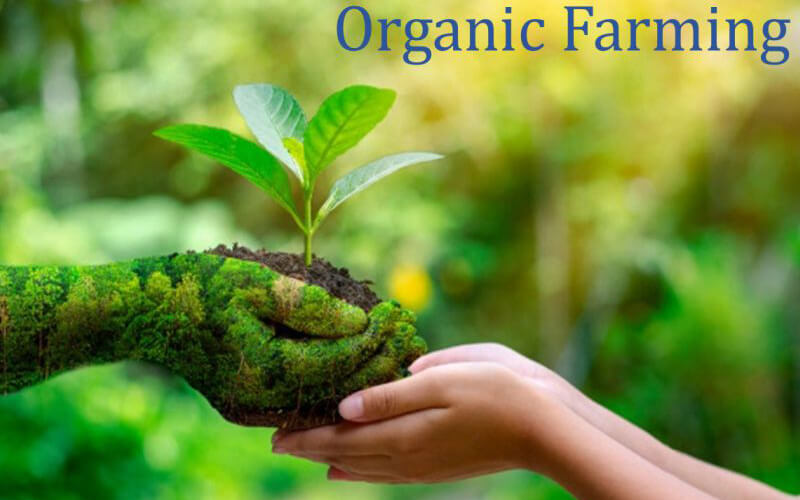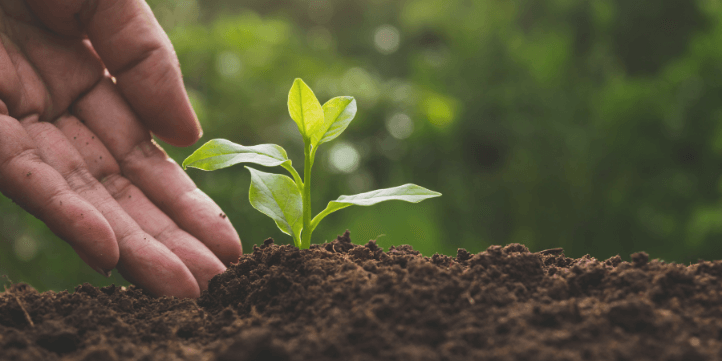Advantages and Disadvantages of Organic FarmingA balanced diet is crucial for maintaining good health; all almost everyone is well aware of this fact. However, in today's world, fruits, vegetables, and grains grew with artificial fertilizers harm our health. In such a case, we must encourage the next generation to practice organic farming with us. 
Using many different types of chemical fertilizers and harmful pesticides to produce more food grains and vegetables harms both the organic and inorganic components of nature. As a result, land fertility is decreasing, and the environment is deteriorated and the downfall of human health are all ongoing. Types of Organic FarmingThere are two forms of organic farming.
Importance of Organic Farming
Organic farming is an essential method of preserving the natural environment. Organic farming keeps the environment pristine and less contaminated, and the resources needed to sustain life on earth are less threatened. In addition, organic farming is introduced to provide wholesome food for people. They become less resistant to serious diseases when they consume organic farming products in the form of nutritious food, as very few or no chemicals enter their systems through food. Additionally, the soil is still in great condition and is overly productive due to using natural manures in organic farming. Advantages of Organic FarmingThe following are some of the advantages of organic farming: 1. Organic farming provides valuable specialty crop opportunities One of the major benefits of organic farming is the ability to begin diversifying the items grown each year. Traditional farms rely on cash crops to profit and stay in business. As a result, soybeans and maize are the principal crops farmed in these facilities. Organic farmers can raise various things, including heirloom vegetables that may be sold at a higher total price throughout the year. Heirloom crops have a unique flavor character, the possibility for improved nutrition, and the ability to conserve seeds for future planting. Their seeds are typically less costly than hybrids. 2. Organic farming can assist future generations in achieving success Organic farming practices focus on generating a healing process for our soils that allows us to use them indefinitely for crop production. Rather than focusing on large short-term gains that might devastate the land and surrounding natural resources, this strategy teaches us to live and work within our means. It tries to increase rather than decrease the natural capital values in our world. As a result, when organic methods are used effectively, they can assist in developing long-term sustainable food chains that can feed a growing population. 3. Natural fertilizers are used in organic farming to increase yields Farmers that follow organic farming practices don't just sow their seeds and wait for nature to take its course. They employ several soil fertilization measures to promote the growing infrastructure of their crops. Techniques like green manure, worm farming, compost application, and cover crops improve soil stability while reducing pests, weeds, and other potential hazards that workers may encounter throughout the growing season. Every tactic promotes greater levels of biodiversity at the local level while enhancing the long-term productivity of the fields. 4. Organic farming is a more environmentally friendly way of growing Organic farming also has climatic advantages to consider. This method's procedures aid in the storage of carbon in our soils. It minimizes the energy required to produce a crop since manual labor is employed more frequently than mechanical instruments. When employing organic materials, fewer petroleum-based products are used, decreasing greenhouse gas emissions. Additionally, it will assist the woods and prairies that make up our natural ecosystems and store carbon. 5. Insect pollinators are supported by organic farming Farmers that utilize organic methods do not use synthetic agents such as glyphosate or neonicotinoids, which pose a significant risk of harm to pollinating insects that maintain agricultural systems worldwide. Harvard researchers discovered that these chemicals were one of the key causes of Colony Collapse Disorder. Between 2014 and 2015, up to 40% of honeybee colonies died, and researchers discovered that neonicotinoids, the most extensively used pesticides for commercial growing, were responsible for six times the loss compared to Nosema, a parasitic fungus. 6. Organic farming provides improved pest and disease resistance. Plants grow healthier when the soil foundations supporting their roots have a natural disease-resistance profile. The plants benefit from this process by developing a better immunological profile, which makes them naturally resistant to disease and pests. When there is an acceptable pH level and other optimum circumstances like sunshine and water, their defensive systems function to reject intruders. It produces a thicker plant cell wall, resulting in better plant development overall. 7. Organic farming promotes a healthier work environment Local communities, staff, and even farmers are not exposed to synthetic agricultural chemicals when organic farming practices are used. When there is an excessive amount of exposure, toxicity concerns may arise. People who come into frequent contact with pesticides as part of their professional activities have a greater risk of neurological illness than the general population. Farmers might also experience several distressing symptoms, ranging from memory loss to migraines to chronic weariness. 8. Organic farming does not use genetically modified crops. When you buy organic foods, you are acquiring things that have not been genetically changed using unnatural processes. Within the industry, GMOs are prohibited. Farmers will continue to cross-breed goods to take advantage of certain growth qualities, but this process will be accomplished by pollination or breeding rather than genetic splicing and dicing. 9. Organic farming produces healthier meals When organic farming is used, taste profiles and nutritional content are greatly enhanced. Peaches cultivated in this manner often have a greater polyphenol content, which contributes to their superior flavor. Cows allowed to graze on the pasture generate dairy products with greater amounts of Vitamin E and Omega-3s, resulting in a richer antioxidant profile for customers. Although conventional farming produces more food, organic farming enhances the overall quality of the food, allowing customers to eat less. 10. Organic farming contributes to better soils Farmers commonly use crop rotation to maintain a healthy balance of nutrients in their soil. In the Midwest region of the United States, a typical rotational technique may involve planting corn for one year, followed by oats for the next, before using the area for pasture or hay crops for the next two to six years. This procedure results in higher amounts of organic matter content and improved aeration, which can lead to increased production. Better soils result from the absence of synthetic herbicides, pesticides, fertilizers, or chemicals used on the farm's crops. Only natural soil additions are authorized if the site is certified as organic. Disadvantages of Organic FarmingThe following are some of the disadvantages of organic farming: 1. Organic farming in the United States lacks a supporting infrastructure A lack of infrastructure in the United States supports the natural methods utilized in this farming model. Organic farmers employ the same industrial transportation technologies as cash crop farmers to bring food to customers' tables. This indicates that even if soil-friendly methods are employed to cultivate the crops initially, the same harmful practices might still cause environmental damage. 2. Organic farming does not always take prior practices into account Transitioning from conventional to organic farming boosts the global food chain because of all the benefits involved. Unfortunately, the issue of synthetic chemicals remaining in the soil might exist for farmers who modify their operations for decades due to their concentration levels. Farms can still sell "organic" products in this circumstance because their existing practices match the specified requirements. Because of prior production methods on the same land, the food may still contain trace levels of synthetic ingredients despite the labeling and measures involved. 3. Organic producers must go through a strict certification procedure. Did you know that there are multiple levels of "organic" in the United States? Items 100% organic are labeled with a special marking that certifies that every procedure adheres to industry standards. Each product must undergo a certification process to qualify for this labeling option. At least 95% of the ingredients in a product must be organic for it to be classified as "organic." Before the product is sold, it may still get USDA-approved chemical additions. Only particular things follow industrial methods if "manufactured from organic materials." 4. Organic agriculture is rarely supported This disadvantage largely affects organic farming in any country. You won't see direct payments made to inflate pricing systems and artificial techniques to increase yields, making turning organic financially difficult for some. Programs like the Environmental Quality Incentives Program will pay farmers to transform from conventional agricultural practices to organic operations. Some organizations will assist farmers with the price of certifying their property as organic. There are also crop insurance subsidies available. 5. Organic farming still employs fungicides and chemicals The word "synthetic" should be considered while examining organic agricultural practices. There is only one requirement: the product must be made from natural rather than artificial sources. Various fungicides and insecticides may still be used in organic farming. These goods are potentially hazardous since they need a repeated application, which promotes the storage of chemicals in the soil that may exceed permissible concentration limits in some places. 6. Organic farming demands more effort than conventional methods Organic farming needs a significant amount of physical labor to be effective. Workers are required to control weeds and perform cultivation techniques manually. This disadvantage can be reduced by concentrating on biointensive farming or permaculture, but both methods also need a more hands-on approach than conventional cash-farming techniques. Even if you try to experiment with various production processes, finding the ideal mix of procedures that optimize earnings might take years of trial and error. 7. Organic farming faces several marketing challenges to consider The obstacles faced by organic products are distinctive. Traditional farmers have an established market through which they may sell crops and agricultural goods. They can ship to grocery shops, tap into a profitable export market, and reach out to local customers. Even though there are options for agricultural co-ops, grocery store inclusion, and local markets that run on specified days, most communities have different access levels for product sales. Due to this, farmers find it challenging to sell their goods at the highest possible profit margin. 8. Organic farming takes specialized expertise to be effective Organic farmers need to be aware of the ecology of their soil. They must understand how to create natural systems that function with their climate and crops. Farmers must devote time to learning about industry developments or seeking alternate solutions because support mechanisms that assist typical farms are only sometimes available. This approach depends on the experience of personnel who monitor crops throughout critical growth times to guarantee the plants grow healthily. This method will only work if you have this knowledge and the desire to put it into practice. Comparison Table for Organic Farming's Advantages and Disadvantages
Next TopicAdvantages and Disadvantages of SEBI
|
 For Videos Join Our Youtube Channel: Join Now
For Videos Join Our Youtube Channel: Join Now
Feedback
- Send your Feedback to [email protected]
Help Others, Please Share










